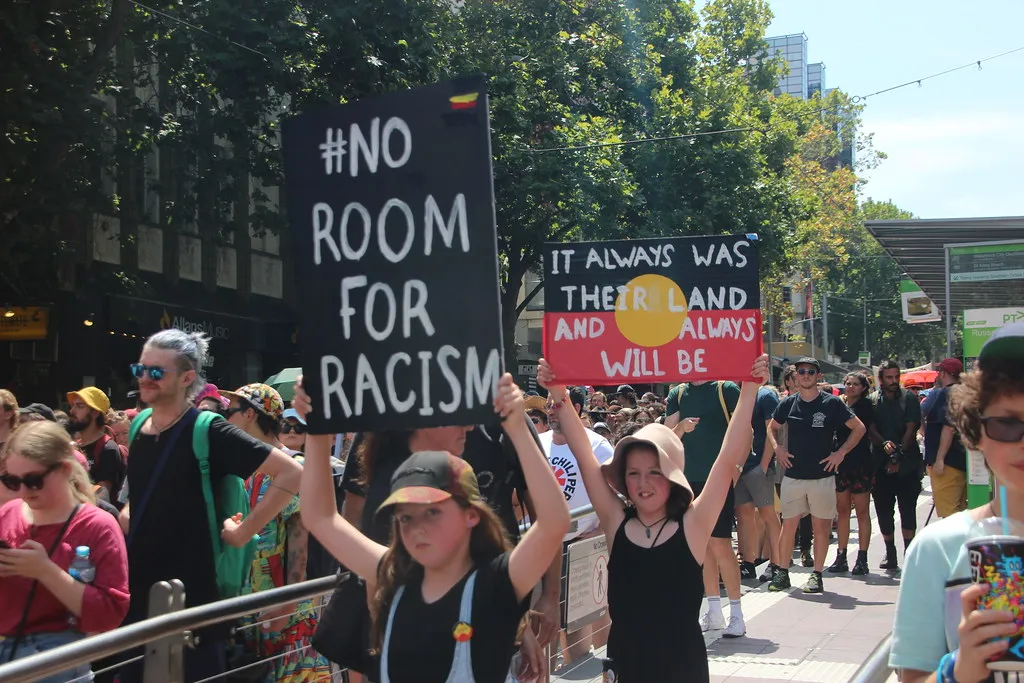Australia Changes National Anthem Lyrics to Recognize Its Long Indigenous History
“Advance Australia Fair” no longer calls a nation with a 65,000-year history “young and free”
:focal(468x141:469x142)/https://tf-cmsv2-smithsonianmag-media.s3.amazonaws.com/filer/02/6f/026f5ec6-2da0-4bf9-a8f5-04c318d6d54d/advance_australia_fair.jpg)
People have lived in Australia for tens of thousands of years. But, for decades, the national anthem, “Advance Australia Fair,” referred to the nation as “young.” Now, in a move cheered by some of the country’s almost 800,000 Indigenous people, that lyric has changed. On January 1, the government officially altered the song’s second line. With the new wording, the anthem begins “Australians all let us rejoice/For we are one and free,” swapping out the previous line “young and free.”
"In terms of culture, society, and population, we go back 60,000 years. We're very definitely not young," First Nations Foundation chair Ian Hamm, a Yorta Yorta man, tells Australian Broadcasting Corporation’s Andrew Greene. “‘One and free' looks for what brings us together. It's actually a focal point for that discussion about who we are as a country.”
Australian leaders from across the political spectrum, including state premiers and Prime Minister Scott Morrison, supported a change to the anthem after its exclusion of Indigenous history became the subject of mounting public criticism in recent years. Morrison announced the change on New Year’s Eve.
The New York Times’s Jacey Fortin writes that critics object to the “young and free” line because it implies the country’s history began with colonization, such as the arrival of the first European settlers on January 26, 1788. That date is commemorated as the official Australia Day holiday, but some Aboriginal and Torres Strait Islander people refer to it as “Invasion Day.” Humans arrived in Australia at least 65,000 years ago, as Jason Daley reported for Smithsonian magazine in 2017, though at least some of the ancestors of today’s Indigenous people probably arrived more recently.

Per the Aboriginal Heritage Office, a cultural preservation organization, around 750,000 people belonging to more than 400 nations lived in Australia when Europeans arrived in the 18th century. The group quotes Beryl Beller, an elder of the Dharawal people, describing Indigenous life at the time Britain treated the island as “terra nullius”—Latin for “nobody’s land”—that was theirs for the taking:
“When Lieutenant James Cook first set foot on [Indigenous] land…he said ‘oh lets put a flag up somewhere, because these people are illiterate, they’ve got no fences.’ They didn’t understand that we didn’t need fences [sic].”
This isn’t the first time the national anthem’s words have been amended. Nineteenth-century Scottish-born Australian Peter Dodds McCormick wrote “Advance Australia Fair,” inspired by a concert showcasing anthems from around the world in which Australia had no representative song, as Monique La Terra explained at Culture Trip. The song’s first performance occurred in 1878, but it wasn’t until 1984 that it officially replaced “God Save the Queen” as the national anthem. At that time, the first line of the song was changed for the purpose of gender inclusivity, from “Australia’s sons let us rejoice” to “Australians all let us rejoice.”
In recent years, “Advance Australia Fair” has been tied up in questions about the nation’s relationship with its Indigenous citizens, who have an average life expectancy 20 years shorter than non-Indigenous Australians and are much more likely to live in poverty. Last month, BBC News reports, the nation’s rugby team sang the anthem in both the Eora language and English before an international match for the first time. A number of Indigenous athletes have also refused to stand for or sing the anthem because it fails to represent them.
While the one-word swap was supported by Australian political parties across the ideological spectrum, its reception has not been uniformly positive. As the Guardian’s Daniel Hurst reports, some Indigenous advocates and leaders of the Green and Labor parties have called for policy change that goes beyond a symbolic gesture, like formal input on laws that affect Aboriginal and Torres Strait Islander people. Meanwhile, some senators from the National Party, which holds relatively few parliamentary seats, criticized the change.
Yorta Yorta singer and composer Deborah Cheetham, who declined to sing the song at the 2o15 Australian Football League grand final. Cheetham tells ABC’s Alicia Nally that she supports changing the anthem but that she would still like to see a larger change.
“The recognition of all Australians now and the connection we have to the longest continuing culture in the world, that is what needs to be captured in our nation's anthem and I think one word at a time, I'm not sure that is the way to go about it really,” she says. “What this change brings is an opportunity for conversation.”
/https://tf-cmsv2-smithsonianmag-media.s3.amazonaws.com/accounts/headshot/Livia_lg_thumbnail.png)
/https://tf-cmsv2-smithsonianmag-media.s3.amazonaws.com/accounts/headshot/Livia_lg_thumbnail.png)